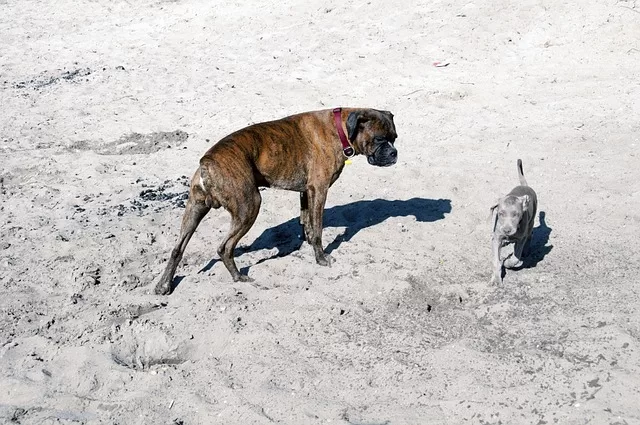This post contains affiliate links. See our Affiliate Disclosure Statement page for more details.
Table of Contents
Is Your Boxer Dog Hyper?
Boxer dogs are consistently ranked in the top 10 to 15 most popular dog breeds every year.
However, without proper training and socialization, boxers can become bored and unruly resulting in a hyper boxer dog.
In this article, we describe the 5 reliable causes of a hyper boxer dog and present the best solutions for preventing hyperactivity.
5 Reliable Causes of a Hyper Boxer Dog
- Breed Characteristics
- Lack of Exercise
- Lack of Training
- Boredom
- Health Issues
A study reported that 53% of people turning their dogs into a shelter was due to hyperactive behavior. Source (Journal of Applied Animal Welfare, Salman, et. al 1998).
Let’s look at the 5 causes of hyper boxer dogs and solutions to help calm them in more detail, to prevent drastic measures like returning them to shelters.
Breed Characteristics

Our Boxer dog Chloe with her Toy
Boxer dogs were originally bred for hunting and were used as working dogs for their athleticism and stamina.
Their breed characteristics include the following traits that contribute to their hyperactivity:
- High Energy Level
- Boxer dogs are known for their high energy levels, which make them naturally active and playful.
- They have a lot of energy to burn and need to engage in physical activity to release their pent-up energy.
- Enthusiastic Nature
- Boxer dogs have cheerful and enthusiastic personalities.
- They are always eager to play and engage in activities with their owners.
- Their enthusiasm can sometimes come across as hyperactivity.
- Strong Prey Drive
- Boxer dogs have a strong prey drive, which makes them instinctively chase and hunt.
- This drive can make them restless and energetic, especially if they don’t get enough opportunities to engage in physical activities that satisfy their natural instincts.
- Athleticism
- Boxer dogs are a muscular and athletic breed.
- They have a lot of stamina and endurance, which allows them to engage in physical activities for long periods of time.
- They are built for running, jumping, and playing, which contributes to their hyperactive behavior.
- Intelligence
- Boxer dogs are intelligent and curious animals that need mental stimulation to keep them engaged.
- They thrive on learning new things and need to be challenged mentally to prevent boredom.
- Their intelligence can also make them stubborn and independent, which can contribute to hyperactivity if they are not properly trained.
Additional Information on Boxer dogs’ high energy levels and how to tire them out can be found in our article
How to Tire Out A Boxer Dog – 5 Best Ways to Have A Happy, Calm Boxer
To learn more about Boxer dog intelligence read our article
Are Boxer Dogs Smart? 3 Essential Ways to Measure A Boxers True Intelligence
In summary, Boxer dogs breed characteristics such as their high energy levels, enthusiastic nature, strong prey drive, athleticism, and intelligence can all contribute to their hyperactivity.
It is important for Boxer dogs to receive proper exercise, training, and mental stimulation to keep them physically and mentally healthy and prevent excessive hyperactivity.
To address a Boxer dog’s need to run, jump and play, we recommend the following products
Kong Flyers and the Chuck It Ball Launcher for running and chasing are available at Cherrybrook.com
Chuck It Fumble Fetch Ball for play which is available at Cherrybrook.com.
Lack of Exercise

Bored Boxer Looking for Exercise
Image by Rikki Andersen from Pixabay
Boxer dogs are known for their high energy levels and playful nature, but without sufficient exercise, they can become hyperactive.
Some of the reasons why lack of exercise can lead to a hyper boxer dog include
- Excess Energy
- Boxer dogs are a high-energy breed and require regular exercise to burn off excess energy.
- Without adequate exercise, this excess energy can manifest as hyperactivity, which can lead to destructive behavior such as chewing, digging, and excessive barking.
- Lack of Mental Stimulation
- Boxer dogs are intelligent and require mental stimulation as well as physical exercise.
- Without sufficient mental stimulation, they may become bored and restless, leading to hyperactivity and destructive behavior.
- Obesity
- Lack of exercise can also lead to obesity in boxer dogs.
- Obesity can cause a range of health problems, including joint pain, heart disease, and breathing difficulties, which can further exacerbate the dog’s hyperactivity.
- Anxiety and Stress
- A lack of exercise can also lead to anxiety and stress in boxer dogs.
- Exercise is known to reduce stress levels in dogs by releasing endorphins, which promote feelings of well-being and happiness.
- Without adequate exercise, boxer dogs may become anxious and stressed, leading to hyperactivity.
- Lack of Socialization
- Boxer dogs are social animals and require regular interaction with people and other dogs to develop good social skills.
- Without adequate exercise, they may become isolated and lack opportunities for socialization, leading to hyperactivity and destructive behavior.
Below is a table of suggested exercises, time duration, and accessories needed to help your Boxer with exercise.
Table – Suggested Exercise Options for Boxer Dogs
| Activity | Time Duration | Supporting Materials |
| Brisk Walk/Run | 30-60 minutes | Leash, Harness, Collar |
| Fetch | 15-20 minutes | Tennis Ball, Frisbee, Flirt Pole |
| Tug of War | 10-15 minutes | Rope Toy |
| Hiking | 1-2 hours | Leash, Harness, Collapsible Water Bowl |
| Swimming | 30 minutes | Life Vest, Pool or Beach Access |
It’s important to note that the exercise requirements for a Boxer dog may vary based on age, health, and individual personality.
It’s recommended to consult with a veterinarian or a professional dog trainer to determine a suitable exercise routine for your Boxer dog.
Read our articles on exercising Boxer dogs below for additional information.
Boxer Dog Exercises – 3 Best Types of Exercise from Boxer Puppy To Senior Boxer Dog
7 Best Common Calorie Burning Exercises for Boxer Dogs And Owners
Overall, regular exercise is essential for boxer dogs to maintain their physical and mental health and prevent hyperactivity.
Without sufficient exercise, they may become restless, anxious, and hyperactive, leading to a range of behavioral and health problems.
We recommend the Joyride Harness Walking Bundle Kit from Joyride Harness for Walking your dog. It allows for better control of your boxer without choking, and it comes with a leash and poop bag kit.
We recommend the Squishy Face Studio Flirt Pole V2 With Lure Squeaky Dog Toy for jumping exercises with your Boxer.
We recommend the Kong AquaFloat Dog Floatation Vest Large for Swimming with your Boxer in a pool or lake.
Lack of Training

Image by Romuald Gałęcki from Pixabay
Lack of training can also contribute to a hyper Boxer dog.
Reasons for a Hyper Boxer Dog – Lack of Training
Some reasons why lack of training can lead to hyperactivity in Boxer dogs include
- Lack of obedience
- Boxer dogs are known for their intelligence, but without proper training, they may not understand what is expected of them.
- This can lead to disobedient behavior such as jumping on people, pulling on the leash, and not responding to commands.
- This lack of obedience can be frustrating for the owner, and the dog may become hyper in response to the owner’s frustration.
- Lack of socialization
- Boxer dogs are social animals and require proper socialization to learn how to interact with people and other dogs.
- Without proper socialization, they may become fearful or overly excited in social situations, leading to hyperactive behavior such as jumping, barking, and lunging.
- Lack of mental stimulation
- Boxer dogs are intelligent and require mental stimulation to prevent boredom and hyperactivity.
- Without proper training, they may not receive enough mental stimulation, leading to hyperactive behavior such as destructive chewing or digging.
- Reinforcing bad behavior
- Without proper training, owners may inadvertently reinforce bad behavior in their Boxer dogs.
- For example, if the dog jumps on people and the owner responds with attention or treats, the dog may continue to jump and become hyper in anticipation of receiving attention or treats.
- Lack of exercise
- Training and exercise often go hand-in-hand, and without proper training, the Boxer dog may not receive enough exercise.
- As mentioned earlier, a lack of exercise can lead to hyperactivity due to excess energy.
Get additional information on training your Boxer to prevent a hyper boxer dog in our articles
Boxer Dog Training – 6 Effective Training Skills for a Loyal, Obedient Boxer
3 Common Boxer Dog Behavioral Issues and Practical Solutions for a Well-Behaved Dog.
Hyper Boxer Dog – Lack of Training Effects
- Lack of Discipline:
- Without proper training, Boxer dogs may lack discipline and engage in unruly behavior.
- This can include
- Jumping on people
- Pulling on the leash
- Excessive barking
- This behavior can be mistaken for hyperactivity when it is actually a lack of appropriate training and discipline.
- Unmet Needs
- Boxer dogs have certain needs that must be met to prevent boredom and frustration.
- Without proper training, they may engage in destructive behavior to alleviate their boredom and frustration.
- This behavior can be mistaken for hyperactivity when it is actually a result of unmet needs.
- Anxiety
- Boxer dogs are social animals and may experience separation anxiety if they are left alone for extended periods of time.
- Without proper training, they may become anxious and engage in hyperactive behavior to cope with their anxiety.
To help prevent anxiety which can result in a hyper Boxer dog, read our article
9 Best Ways to Mentally Stimulate Your Boxer Dog for a Hapy Obedient Companion.
Overall, lack of training can lead to a range of behavioral problems in Boxer dogs, including hyperactivity.
Proper training can help prevent these problems by teaching the dog what is expected of them and providing mental and physical stimulation.
Below is a table on some suggested training and supported tools and accessories to prevent a hyper Boxer Dog.
Table – Suggested Training to Prevent a Hyper Boxer Dog
| Training Activity | Tools/Accessories Required |
| Basic Obedience Training (Sit, Stay, Come) | Treats, Clicker, Leash, Collar/Harness |
| Crate Training | Crate, Treats, Toys |
| Socialization Training | Exposure to New Environments, Positive Reinforcement |
| Agility Training | Agility Course, Treats, Clicker |
| Advanced Obedience Training (Heel, Down, Place) | Treats, Clicker, Leash, Collar/Harness |
It’s important to note that the training activities and tools/accessories required for Boxer dogs may vary based on their age, temperament, and individual personality.
It’s recommended to consult with a professional dog trainer to determine a suitable training plan for your Boxer dog.
We recommend Brain Training For Dogs for Basic Obedience Training to help prevent a hyper Boxer dog.
We use and recommend Holly and Hugo’s Dog Socialization and Obedience Masterclass. This self-paced learning class helps you identify and correct bad behaviors to help with socialization and obedience for your loyal companion.
Want tor try agility training with your Boxer? Try the Better Sporting Dogs – 10 Ft Agility tunnel with Sandbag Dog Toy available at Chewy.com
Boredom

Image by Eirik Raudi from Pixabay
A bored boxer can become a hyper Boxer dog if they don’t receive enough exercise and mental stimulation.
A hyper Boxer dog can develop unwanted and destructive behaviors like jumping on people, digging, chewing, etc.
It’s important to exercise and provide mental stimulation for your Boxer dog to prevent them from becoming a hyper Boxer dog that is difficult to manage.
Boredom can cause hyperactivity in dogs, including boxer dogs, for several reasons:
- Lack of physical exercise
- Boxer dogs are high-energy breeds that require a lot of physical exercise to burn off their energy.
- When they don’t get enough exercise, they can become restless and hyperactive.
- Lack of mental stimulation
- Boxer dogs are an intelligent breed that need mental stimulation to keep them engaged and prevent boredom.
- Without mental stimulation, they may become destructive or hyperactive.
- Separation anxiety
- Boxer dogs can develop separation anxiety when left alone for long periods.
- This anxiety can manifest as hyperactivity, destructive behavior, and excessive barking.
- Attention-seeking behavior
- When bored, boxer dogs may resort to attention-seeking behavior to get their owner’s attention.
- This may include
- Jumping
- Barking
- Pawing
- Frustration
- Boredom can lead to frustration in dogs, which can result in hyperactive behavior.
- For example, a bored boxer dog may start digging, chewing, or running around in circles.
It’s important for dog owners to provide their boxer dogs with enough physical and mental stimulation to prevent boredom and hyperactivity.
This can include regular exercise, interactive toys, training sessions, and socialization with other dogs.
In severe cases, consulting with a professional dog trainer or veterinarian may be necessary to address the underlying cause of the hyperactivity.
The table below provides some suggested activities to help prevent boredom leading to a hyper Boxer Dog.
Table – Suggested Activities to Prevent Boredom and a Hyper Boxer Dog
| Activity | Description |
| Puzzle Toys | Toys that require the dog to work to get a treat, such as a KONG or puzzle feeder. |
| Training Sessions | Short training sessions can provide mental stimulation and bonding time. |
| Playtime | Interactive games such as fetch or tug of war can provide physical and mental stimulation. |
| Walking/Hiking | Regular walks or hikes can provide physical exercise and mental stimulation. |
| Doggy Daycare | Socialization and playtime with other dogs can provide mental and physical stimulation. |
It’s important to note that the activities listed above may not be suitable for all Boxer dogs and their individual needs may vary.
It’s recommended to consult with a veterinarian or professional dog trainer to determine a suitable plan to prevent boredom and hyperactivity in Boxer dogs.
To prevent boredom, try the Frisco 2-tier Interactive Puzzle Toy in either easy or moderate forms.
For treat dispensing toys to help prevent a hyper Boxer dog, we use and recommend the Starmark Treat Dispensing Dog Chew Ball Tough Dog Toy and the Kong Wobblers Treat Dispensing Toy
Health Issues
Boxer dogs are generally a healthy breed, but like all breeds, they may be prone to certain health issues that can cause hyperactivity.
A hyper Boxer dog may be due to underlying health issues.
If you have a hyper Boxer dog, visit your veterinarian to have your dog evaluated for any health issues that may be causing their hyperactivity.
Specific health issues that can contribute to hyperactivity in Boxer dogs and ways they can be alleviated:
- Thyroid Problems
- Hypothyroidism, a condition in which the thyroid gland does not produce enough thyroid hormone, can cause lethargy and hyperactivity in Boxer dogs.
- Treatment typically involves lifelong thyroid hormone supplementation.
- Allergies
- Boxer dogs can develop allergies to environmental factors such as pollen, dust, or food.
- Allergic reactions can cause itching, inflammation, and discomfort, which can lead to hyperactivity.
- Allergies can be alleviated with medications, allergy shots, and dietary changes.
- Hip Dysplasia
- This is a common genetic condition in Boxer dogs and can cause joint pain and discomfort.
- This pain can lead to restlessness and hyperactivity.
- Treatment may involve pain management medications, joint supplements, and surgery in severe cases.
- Dental Issues
- Boxer dogs are prone to dental problems such as gum disease, tooth decay, and tooth loss.
- These issues can cause discomfort and pain, which can contribute to hyperactivity.
- Regular dental cleanings and good oral hygiene can prevent dental problems and alleviate associated hyperactivity.
- Anxiety
- Anxiety can be a contributing factor to hyperactivity in Boxer dogs.
- Anxiety can be caused by a variety of factors such as separation, loud noises, or changes in routine.
- Treatment may involve behavior modification, medication, and environmental changes to reduce stress and anxiety.
It’s important to note that the treatment for health issues that cause hyperactivity in Boxer dogs will depend on the underlying cause and severity of the condition.
It’s recommended to consult with a veterinarian to determine an appropriate treatment plan for your Boxer dog.
Summary – Hyper Boxer Dog
There are 5 reliable causes for a hyper Boxer dog. These include
- Breed Characteristics
- Lack of Exercise
- Lack of Training
- Boredom
- Health Issues
Many of the causes for a hyper Boxer dog can be alleviated through exercise and socialization and obedience training.
It is important for your Boxer dog to follow a regular exercise program and activity time for mental stimulation.
A hyper boxer dog can turn into a happy, healthy, obedient Boxer dog with the appropriate exercise and training.
So, go out and enjoy spending time with your Boxer you will both be better for it.

Discoverboxerdogs.com are Mary and Chris Kustanbauter. We reside in Red Lion, PA with our two Boxers, Duke and Katie, who are both rescue dogs. We have been working with Adopt A Boxer Rescue for the past 17 years and have adopted 5 Boxers from this fine organization. To learn more visit our Home, Boxer Dog Family, and Blogs Pages Visit us on social media on Facebook – Discoverboxerdogs.com, Instagram, and Pinterest.

